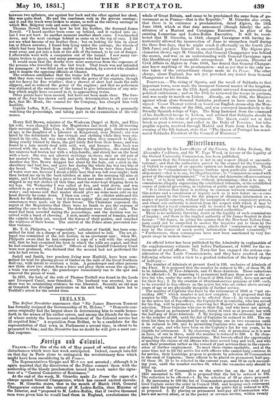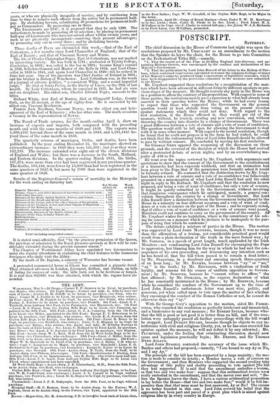33!i5trlInItt0115.
An opinion by the Law-officers of the Crown, Sir John Dodson, Sir Alexander Cockburn, and Sir W. Page Wood, in favour of the legality of the Oxford University Commission,, has been published.
It asserts that the Commission is not in any respect illegal or unconsti- tutional; and that the authorities quoted by the counsel for the University of Oxford in support of an opposite opinion are beside the question. These all relate to "commissions to impose burdens upon particular districts," as ship-money—that is to say, for illegal taxation ; to " commissions armed with power of fine and imprisonment," "or to hear and determine offences contrary to law," or to hear such offences without determining—that is to say, to commissions illegally superseding the established tribunals, or the established course of judicial proceeding, in violation of public and private rights. " It is obvious that there is nothing in common between commissions of this nature and a commission of inquiry such as is now before us—a com- mission issued by the Crown for the purpose of obtaining information on a matter of public concern, without the assumption of any compulsory powers, and whose sole authority is derived from the respect with which it may be expected that a royal commission will be treated by her Majesty's subjects, more especially by public bodies and constituted authorities." There is no authority throwing doubt on the legality of such commissions of inquiry ; and there is the implied authority of Sir James Scarlett in their favour : " Sir James, in giving his opinion that the Merchant Tailors Com- pany could not be compelled to answer the inquiries put to them by the Municipal Corporation Commissioners, admits that commissions of inquiry may be the source of much useful information furnished voluntarily.' " " Furthermore, these commissions have now been sanctioned by very fre- quent usage in modern times."
An official letter has been published by the Admiralty in ex-planatiem of the supplementary estimate laid before Parliament, of 65001. for the re- tirement of naval officers. The Navy-list has engaged the serious con- sideration of the Lords Commissioners, and they have resolved on the following scheme with a view to a gradual reduction of the heavy charge of half-pay-
The number of Admirals at present fixed is 150, exclusive of Admirals of the Fleet. It is proposed that the number be reduced to 99 ; of these 99, 21 to be Admirals, 27 Vice-Admirals, and 51 Rear-Admirals. These reductions to be effected-1. By removing to permanent half-pay those now on the ac- tive list who, under the order in Council of 30th June 1827, have net served for their flag; 2. By the creation of 10 retired-service pensions of 1501. each, to be awarded to flag-officers on the active list who are either above seventy years of age or are physically incapable of further service.
The number of Captains was fixed by the retirement of 1846 at "not ex- ceeding 500," which number is not now complete. It is proposed that the number be 350. The reductions to be effected. thus-1. As vacancies occur in the active list of flag-officers, the Captain first in seniority, who has served for his flag, will be promoted ; reserving her Majesty's undoubted right of selection. Those Captains who rise to their flag, and who have not served, will be placed on permanent half-pay, rising in rank as at present, but with the half-pay of Rear-Admirals. 2. 13y keeping open the retirement of 1846 to the number of 200, until the list of Captains be reduced to 350. The re- tired list then to be diminished by only retiring one in two vacancies until it be reduced to 100, and by permitting Captains who are above fifty-five years of age, and who have been on the Captain's list for ton years, to be eligible for retirement. 3. By observing the rule of promotion as it is new in force, of one in three, until the number is reduced to 350. 4. By aban- doning the system of brevet promotions. But brevets afford the opportunity of meeting the claims of old officers who have served long and well, and who seek their promotion rather as the reward of past services than in the expect- ation of further employment. To meet these claims equitably, and at the same time not to fill the active list with officers who cannot long continue it for service, their Lordships propose to promote by selection 50 Commanders to the rank of Captains; these officers to be placed on permanent half-pay. Of these 50, 20 to be selected in the current year, and 10 in each summd- ing year, until the number reaches 50, when the vacancies only should be filled up.
The number of Commanders on the active list on the 1st of April 1851 amounted to 828. It is proposed that the list be reduced to 469. The reduction to be effected-1. By the selection of 50 as above proposed. 2. By increasing to 100 the list of Commanders promoted to the rank of re- tired Captain under the order in Council 1840, and keeping such retirement open until the number of Commanders on the active list is reduced to 450, as proposed. 3. By placing on permanent half-pay all Commanders who have not served afloat, or in the packet or revenue service, within twenty years, or who are physically incapable of service; and by continuing from time to time to remove such officers from the active list to permanent half- pay. By abolishing brevets, substituting 50 promotions for permanent half- pay as Commanders. By promoting one in three. The Lieutenants are 2147; it is proposed that they be only 1200. The reductions to be made by promoting 50 by selection ; by placing on permanent half-pay all Lieutenants who have not served afloat within twenty years, and such as are physically incompetent—reserving their present advantages; by promoting only one in every three ; and by abolishing brevets.
Three deaths of Peers are chronicled this week,—that of the Earl of Cottenham, a few months since Lord Chancellor of England ; that of the Earl of Bantry ; and that of Viscount Newry and Morrie. The life of Charles Christopher Pepys, Earl of Cottenham, was not marked by interesting variety. He was born in 1781 ; graduated at Trinity College, Cambridge, in 1803; was called to the bar in 1804; became King's counsel in 1826, Solicitor-General and Master of the Rolls in 1834, and Lord Chan- cellor in 1836 to 1841, and again Lord Chancellor in 1846—till he retired in June last year. One of his ancestors was Chief Justice of Ireland in 1664 ; and his brother is Bishop of Winchester. Lord Cottenham was, in the words of a journal of adverse politics, " a consistent Whig, and a sound impartial judge." He died at Santa Pietro, in the Duchy of Lucca, on the 29th of last month. By Lady Cottenham, whom he espoused in 1821, he had six sons and six daughters. His eldest son, Charles Edward Pepys, succeeds to the titles.
Richard White, first Earl of Bantry, died at Glengariff Lodge, County Cork, on the 2d instant, at the age of eighty-four. He is succeeded by his eldest son, Viscount Beerhaven. Francis Jack Needham, Viscount Newry, was the eldest son and heir- apparent of the Earl of Kilmorey ; who has other sons. The death occasions a vacancy in the representation of Newry.
The Board of Trade returns, for the month ending April 5, show an increase of exports and imports, both compared with the preceding month and with the same months of 1849 and 1850. The exports were 1,599,4331. beyond those of the same month in 1849, and 1,181,4441. be- yond those of the same month in 1850.
The quarterly returns of marriages, births, and deaths, have been published. In the year ending December 31, the marriages showed an extraordinary increase : in 1849 they were 141,599 ; last year they were 152,235. The increase extended over eight out of the eleven divisions of England and Wales ; but there was a decrease in the South, Midland, and Eastern divisions. In the quarter ending March 1851, the births, 157,374, were more than ever had been registered in any previous quarter. The deaths, 105,446, were fewer by 15,000 than had been registered in the same quarters of 1847-8, but more by 7000 than were registered in the same quarter of 1850.
Results of the Registrar-General's return of mortality in the Metropolis for the week ending on Saturday last.
week-
of 1861. 177 44 211 129 43 146 60 16 6 9 21 31 45 34 994
It is stated semi-officially, that "by the gracious permission of the Queen, the privilege of admission to the Royal pleasure-grounds at Kew will be con- siderably extended during the present summer season." The Chapter of Westminster Abbey have appointed two interpreters to assist the regular attendants in explaining the chief features to the numerous foreigners who daily visit the Abbey. By the death of Dr. Ingram, a canonry of Worcester has become vacant.
A pretended commercial house at Ghent has committed a gigantic fraud. They obtained advances in London, Liverpool, Belfast, and Dublin, on bills of lading for cargoes of corn : the bills turn out to be fictitious or forged. It is said that 60,0001. was thus obtained, with which the rogues have ab- sconded. Zymotie Diseases Dropsy, Cancer, and other diseases of uncertain or variable seat Tubercular Diseases Diseases of the Brain, Spinal Marrow, Nerves, and Senses Diseases of the Heart and Blood-vessels Diseases of the Lungs, and of the other Organs of Respiration
Diseases of the Stomach, Liver, and other Organs of Digestion
Diseases of the Kidneys, &e Childbirth, diseases of the Uterus, &.e Rheumatism, diseases of the Bones, Joints, Sc Diseases of the Skin, Cellular Tissue, Se Malformations Premature Birth Atrophy
Age
Sudden Yiolence,Privation, Cold, andIntemperance Total (including unspecified causes) Ten
o[1841
'Weeks -50. 1,660 .... 457 .... 1,857 .... 1,136 .... 311 ....
1,282 • • • • 533 • • • • 87 .... 100 • • • • 87 ....
75 •...
207 ••. • ... 134 ...• 515 • • • • 103 .... 260 • ...
8,829



























 Previous page
Previous page